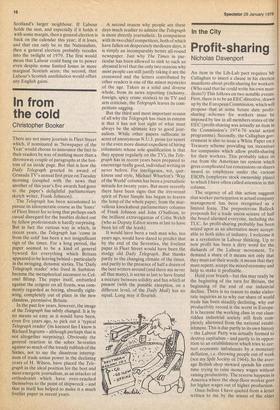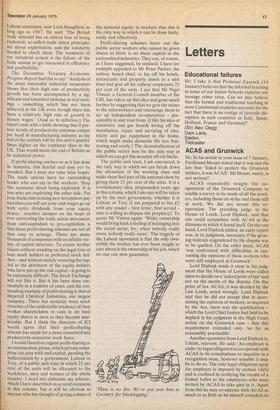In the City
Profit-sharing
Nicholas Davenport
An item in the Lib-Lab pact requires Mr Callaghan to insert a clause in his election manifesto about profit-sharing for workers. (Who said that he could write his own man ifesto?) This follows on two notable events.
First, there is to be an EEC directive, drawn up by the European Commission, which will propose that at some future date profit sharing schemes for workers must be imposed by law in all members states of the EEC (profit-sharing was actually an item in the Commission's 1974-76 social action programme). Secondly, the Callaghan gov ernment is also to issue a White Paper on a Treasury scheme providing tax incentives for companies which allow profit-sharing for their workers. This probably takes its
cue from the American tax system which gives complicated tax concessions on shares
issued to employees under the various ESOPs (employee stock ownership plans) to which I have often called attention in this column.
The urgency of all this action suggests that worker participation in actual company management has been recognised as a limited foray. The preposterous Bullock proposals for a trade union seizure of half the board alarmed everyone, including the TUC. So profit-sharing probably has been seized upon as an alternative more accept able to both sides of industry. I welcome it as a revolution in Labour thinking. Up to now profit has been a dirty word for the diehards of the Labour movement. To demand a share of it means not only that they must eat their words: it means that they must repent, accept the mixed economy and help to make it profitable.
Hold your breath — but this may really be the beginning of the turn for Britain, the beginning of the end of our industrial decline. There is no reason to make elaborate inquiries as to why our share of world trade has been steadily declining, why our productivity record is the worst in Europe.
It is because the working class in our classridden industrial society still feels com pletely alienated from the national establ ishment. This is due partly to its own history — the Labour Party was actually formed to destroy capitalism — and partly to its oppos ition to an establishment which tries to cor rect economic imbalances by a monetary deflation, i.e. throwing people out of work (see my Split Society of 1964). So the aver age British shop steward spends his entire time trying to raise money wages without raising productivity. The reverse happens in America where the shop-floor worker goes for higher wages out of higher production.
Once before I have quoted from a letter written to me by the wisest of the elder
Labour statesmen, now Lord Houghton, as long ago as 1967. He said: 'The British trade unionist has an inbred fear of being exploited; so-called trade union principles are about exploitation, and the solidarity needed to check them. The weakness of our industrial system is the failure of the trade unions to get interested in efficiency and profitability.'
The December Treasury Economic Progress Report had this to say: 'Analysis of the more successful industrial economies shows that their high rate of productivity growth has been accompanied by a significant and sustained increase in real earnings — something which has not been achieved in the UK even though there has been a relatively high rate of growth in Money wages.' (And so in inflation.) The report ends with a table showing that if present trends of productivity continue output Per head in manufacturing industry at the end of the century will be two and a quarter times higher on the continent than in the UK. That would mean the end of Britain as an industrial power.
If profit-sharing catches on as it has done in America, this fearful end may yet be avoided. But I must not raise false hopes. The trade unions have no outstanding leader who can say to the workers: 'Stop this nonsense about being exploited. It is You who are exploiting the other side. Put your backs into making new investment pay and then you will see your cash wages go up with extra dividends from your equity shares.' Another damper on the hope of ever converting the trade union movement from anti-capitalism to pro-capitalism is that these profit-sharing schemes are not all that easy to arrange. There are many thousands of companies with an infinite variety of capital structure. To create worker shares without treading on the legal toes of loan stock holders or preferred stock holders — and without unduly watering the capital to the detriment of the equity holders who have put up the risk capital— is going to be extremely difficult. The Stock Exchange will not like it. But it has been done successfully in a number of cases, and the outstanding example of profit-sharing is that of Imperial Chemical Industries, our largest company. There has certainly been much criticism of the undeniable tendency of their worker shareholders to cash in on their equity shares as soon as they become marketable. But I think the directors of ICI Would agree that their profit-sharing scheme has made for a more contented and Productivity-conscious work force.
I would therefore regard profit-sharing as an intermediate phase, which private enterprise can play with and exploit, pending the authorisation by a government, Labour oi Tory, of a public unit trust in which 25 pet
cent of the units will be allocated to the Workforce, men and women of the whole Country. I need not elaborate my scheme, which I have described on several occasions in this column, but it will be obvious to anyone who has thought of giving a share of the national equity to workers that this is the only way in which it can be done fairly, easily and effectively.
Profit-sharing schemes leave out the public sector workers who cannot be given shares as there is no share capital in the nationalised industries. They can, of course, as I have suggested, be unitised. I have for example appealed to Mr Peter Parker, the railway board chief, to lay off his hotels, restaurants and property assets in a unit trust and give all his railway employees 25 per cent of the units. I see that Mr Nigel Vinson, a General Council member of the CBI, has taken up this idea and gone much further by suggesting that we give the mines to the mineworkers and encourage them to set up independent co-operatives — presumably in unit trust form. (I like his idea of electricity and gas boards hiving off the installation, repair and servicing of electricity and gas equipment in the home, which might make domestic life less frustrating and costly.) The decentralisation of the public sector may be the only way in which we can get this monster off our backs.
The public unit trust, I am convinced, is the only way in which we can break down the alienation of the working class and make them feel part of the national show by giving them 25 per cent of the units. It is a revolutionary idea, propounded years ago in this column, which Lam sure will be taken up by the next government, whether it is Labour or Tory (I am prepared to bet £5 with any reader — first letter, first served — who is willing to dispute the prophecy). To quote Mr Vinson again: 'Wider ownership would bring back a feeling of belonging into the social scene, for, when nobody really owns, nobody really cares'. The tragedy of the Labour movement is that the only ownership the worker has ever been taught to care about is the ownership of his job, which no one can now guarantee.



































 Previous page
Previous page